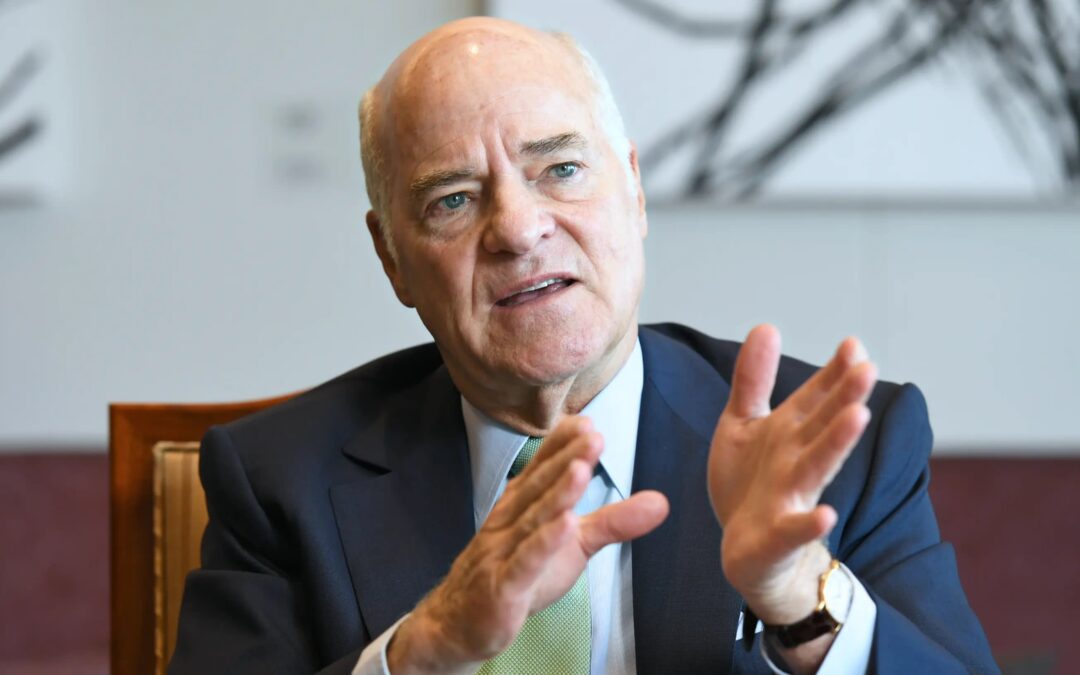As the coronavirus pandemic rewrites the financial forecasts of businesses from travel to energy and retail, private equity firms are intensely focused on tech businesses they believe can weather the storm. The thesis is that companies are shifting operations online at a fast, do-or-die clip — a scramble that’s created demand for cybersecurity services and new product delivery platforms like ordering groceries online.
Now, what was already an increasingly competitive arena coming into the pandemic is getting packed, as huge private-equity firms jump into the fray, highlighting their size and offering creating financing to prospective targets.
Tech investing has historically been most closely associated with specialty players like Silver Lake, Thoma Bravo, and Vista, but large, generalist PE shops have expanded their tech arms in recent years, and all are vying for a piece of the pie.
According to a Bain & Co analysis of Dealogic data, tech as a percentage of all private-equity deals rose from 20 percent in 2010, to 32 percent in 2019. And during the first half of this year, tech comprised 36 percent of PE deal volume, according to Bain.
“There’s a lot of capital chasing few private equity deals in technology,” said John Park, a partner with KKR who leads its tech industry team.
“And there’s a scarcity quotient to great tech businesses.”
Large generalist PE shops pitch for size
KKR is one of the large generalist private-equity firms — with $207 billion in assets under management — that isn’t exclusively focused on tech, but is prioritizing the sector, having raised a $2.2 billion fund in January focused on growth investments in telecom, media and tech companies, and snapping up Cisco veteran Rob Salvagno to help find opportunities.
While the firm also invests in healthcare, alternative energy and insurance, it’s already made seven investments fueled by its $2.2 billion growth fund, Salvagno told Business Insider, including o9 Solutions, a provider of software and data analysis tools for business planning, and Slice, an online delivery platform for local pizzerias.
“I think we have the history of having invested in technology for a long time, and therefore the ability to lean into complexity over a longer duration, whereas I think a newer investor worries about that first year, second year out of the box,” said Park.
Secondly, he said, with an established base of investors, KKR can buy assets of all sizes.
That pitch is growing louder in the tech investing community, as firms like Blackstone Group and Carlyle Group, as well as Clayton Dubilier & Rice, are ramping up in TMT, resulting in large funds, but also stiffer competition, meaning that there will almost certainly be no discounting in price, according to investors and consultants.
Some of the most prominent deals struck by these giants in recent months include Blackstone’s $4.7 billion purchase of Ancestry.com, the family tree mapping company, Warburg and TPG’s investment in Norwegian software developer Visma, along with smattering of private-equity shops such as KKR, TPG, and Vista, investing in Indian telecom operator Jio Platforms.
“There is more money flowing into the sector and funds that have, in the past, been a little more reluctant, are discovering a good revenue model from a software company that is better than an airline,” said Michael Wand, a managing director with Carlyle.
Carlyle is acquiring software firm Unison and helped business intelligence company, ZoomInfo, go public this summer.
Private equity’s tech journey has been 10 years in the making
Private equity’s tech ambitions were already gaining steam before the pandemic: Boston-based Advent International raised its first technology fund in September 2019, reaching $2 billion, and Bain & Co. was talking about whether there was a tech bubble in January. Capital raising for tech funds more than doubled in the last five years, to $334 billion in 2019, per Preqin data.
What’s changed over the past five months, ever since travel ground to a halt and businesses have moved online, is that new opportunities have been unleashed by a demand for digitization, consultants said.
“Now people are having to work from home and there is a need for more connectivity, more collaboration, and better security,” said Chris Perry, who co-leads Bain’s tech practice.
“These are areas where companies need to make further investment.”
The demand is complemented by a longstanding rationale: investors love the stable revenues generated from subscription products like software platforms.
Once a company starts using tech, it can be difficult to stop, and it presents all sorts of upselling opportunities. For instance, once a company embeds a workflow management software, why not pay a little more for a feature that tracks sales opportunities?
And then there is a more timely factor: some companies that received venture capital dollars in the 2000s during the dot com years, have now grown into maturity and are large enough for a private-equity buyout, Perry said.
Software set in PE crosshairs
Of all tech companies seeking a buyer throughout the pandemic, software platforms are shaping up to be the crown jewel among investors, according to bankers and PE execs.
It wasn’t always this way, said Mark Colodny, who heads up Warburg Pincus’s technology, media and telecommunications group, noting that 15 years ago investors shied away from software because many tech companies were in their infancy and less predictable.
“It’s like being on a reasonably out-of-the-way beach and then all of a sudden a cruise ship shows up,” he said.
Their transition to the cloud, from on-premise operations, has only strengthened their revenue streams. Warburg has invested in three U.S. software companies since March and Colodny said the firm’s $5 billion tech portfolio in the U.S. experienced little distress throughout the pandemic.
Warburg isn’t alone.
Over the years, a group of specialty players have focused almost exclusively on tech assets. This group includes Vista Equity ($58 billion AUM), Thoma Bravo ($35 billion AUM), Clearlake Capital ($24 billion AUM), Silver Lake Partners ($60 billion AUM), Insight Partners ($30 billion AUM), and TA Associates ($33 billion AUM).
That’s $240 billion in assets under management between the six of them — more assets than KKR manages overall — meaning that specialty investors own a sizable chunk of the industry, some of them honing their expertise over several decades.
It’s good to be big
One thing the larger private-equity shops have going for them is their vast networks. Given their size, they have deep relationships with bankers, lawyers and business leaders, including specialists from large tech companies who can — if need be — offer their two cents on strategic business decisions.
When Henry Schuck, the CEO of Zoominfo, met with executives from Carlyle in 2018, one of his company’s goals was to expand sales within enterprise companies. Carlyle became an investor and Schuck and his team drafted a list of the top 50 accounts they’d like to land.
From there, the private-equity firm helped clear road blocks in the sales process, he said.
“I remember right after they made their investment, I met with Bill Conway, and at the end of the meeting, the way he left me was, ‘Hey, is there is anything any of us can do for you? If you need to get into an account, or a door we can open, don’t hesitate to call us,'” Schuck said.
Schuck said Carlyle facilitated introductions and helped Zoominfo engage with senior decision makers at prospective customers. He recalls one instance, in particular, when Carlyle exec Ashley Evans introduced them to the chief financial officer of a large tech company — a touch-point, he said, that led to upgrading an account.
“The reach is amazing,” he said.
[Carlyle’s technology, media and telecom group represents the firm’s largest sector by capital deployed, the firm told Business Insider: it has spent $32 billion over 279 deals globally.]
On the other hand, specialty players like Silver Lake, Thoma Bravo, and Vista, have gone narrow and deep on tech, and have rich histories in Silicon Valley. Silver Lake, for instance, famously took Dell private for $24.4 billion, and also sold Skype to Microsoft in a $5 billion deal.
“I think both have their own place in the investment ecosystem,” said Perry, the Bain consultant.
Source: Business Insider
Can’t stop reading? Read more
US Pipeline Operator ONEOK Inks Two Deals for $5.9 Billion
US pipeline operator ONEOK Inc. agreed to buy a Permian Basin rival and a controlling stake in...
Blackstone Is Said to Seek A$5.5 Billion Loan for AirTrunk Bid
Private equity firm Blackstone Inc. is in discussions with banks for a five-year loan of about...
Thrive Capital to lead multi-billion dollar OpenAI investment round at $100bn valuation
OpenAI, the company behind the popular AI tool ChatGPT, is in advanced talks to secure several...




